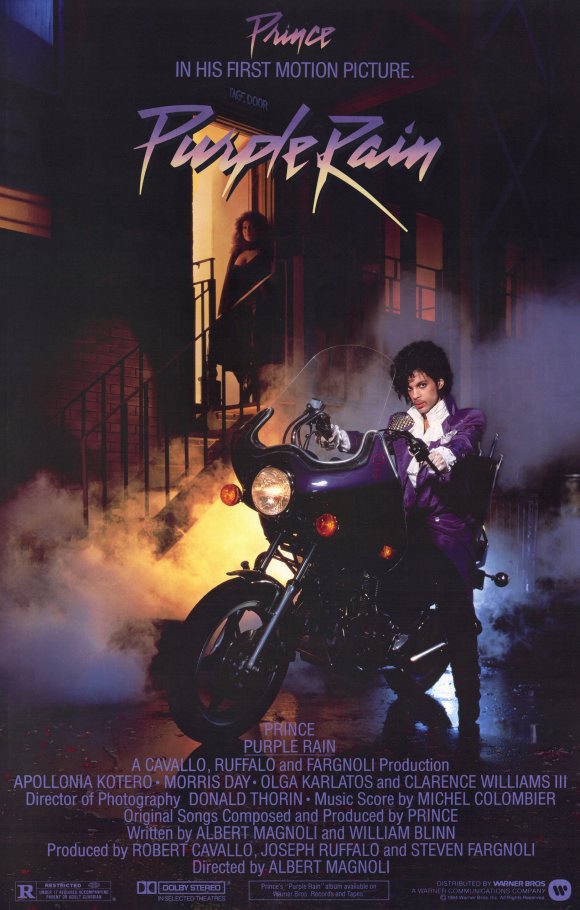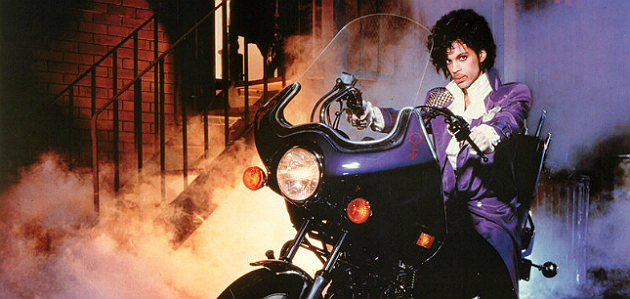Dearly beloved, we are gathered here today to give to this thing called “Purple Rain.” Released in 1984, Albert Magnoli’s pseudo-biopic introduced audiences to the Minneapolis music scene and the royal subject who presided over it. The artist formerly known as “the Artist Formerly Known as Prince” burst upon the screen riding a motorcycle and a purple-tinted wave of popularity. He came to play his music loud, scream his lyrics and seduce with impunity. He dared to wear ruffles, eye liner and a hairstyle homage to Hendrix. Women screamed. Men were confused. A star was born.
Despite its initial critical drubbing, “Purple Rain” won the Oscar for Best Original Song Score, an award His Purple Badness snatched from the grasp of Kris Kristofferson AND the Muppets. Said song score became a smash-hit soundtrack popular enough to battle Bruce Springsteen’s “Born in the USA” for chart domination. The “Purple Rain” album ended one side with the 9 minute titular track, and the other with the song partially responsible for the “Parental Advisory Explicit Lyrics” stickers that adorn countless CDs today. Despite coming from a very R-rated feature, there isn’t a profanity stronger than “hell” on the entire soundtrack. In fact, “Purple Rain” doesn’t even carry the advisory sticker it spawned on its cover.

My 8-year old brother convinced my Mom to not only buy him a copy of the “Purple Rain” soundtrack, but to take us to see the movie as well. Dig if you will the picture of 14-year old yours truly crawling under his seat while visions of bare breasts and animalistic sex (one such scene takes place in a barn!) flashed across the screen of the State Theater. Mom didn’t even bother to cover my bro’s eyes, this despite her practically pulling my eyes out of their sockets during a showing of “Shampoo” 9 years prior. In fact, my Mom loved “Purple Rain” and its star, which was more than I could say back in 1984. I didn’t come around on Prince’s musical genius until two years later.
A few weeks ago, I took in an entertaining midnight screening of “Purple Rain” at the IFC Center in NYC. It had been 30 years since I’d seen it on the big screen, and while there weren’t too many people in the audience, the ones who showed up came to see some asses wiggling, hear some birds squawking and to grind along with “Darling Nikki.” Accompanied by my fellow critic colleagues, Kenji Fujishima and Monica Castillo, I made an active participant fool of myself. “Purple Rain” is not a living room kind of movie. It demands to be experienced in all its awesomely ridiculous glory on the biggest screen, with the biggest speakers and the biggest crowd.
Until this viewing, I’d completely forgotten how well “Purple Rain” is shot. Cinematographer Donald Thorin, lenser of “An Officer and a Gentleman” and “Midnight Run,” earned his paycheck on the musical numbers alone. The concert footage is awe-inspiring, both in shot composition and lighting, and somehow Thorin makes Prince’s goofiest dramatic moments look polished and glossy. There’s a shot of Prince smirking behind co-star Apollonia Kotero that reminded me of the Siskel and Ebert show where they reviewed Rain’s follow-up, “Under the Cherry Moon.” After showing a clip of the most absurdly ridiculous, bug-eyed close-up of Prince, Gene asked Roger “would you allow yourself to be shot like that?!!”
Accompanying the great score and cin-tog is the familiar story of a musician trying to make a name for himself in his profession while falling for a cute woman with her own ambitions. For all its 80’s trappings, some of which are quite distasteful, the screenplay by Magnoli and William Blinn is as old-fashioned corny as those Andy Hardy movies Mickey and Judy made in the 30’s. There are cobwebs on this tale, so “Purple Rain” tries to merge it with a more contemporary, darker story of dysfunctional family life.

The pieces don’t fit, but Prince attempts to sell each and every one of them. His intentions are noble, to the point where one must give him an A for effort. He may not actually be able to kick Linc from The Mod Squad’s ass, but damn if he doesn’t step (and spin) into the room as if he could. Even the Razzie Awards left Prince’s acting alone, opting instead to attack a wonderfully trashy yet dreadful song he wrote called “Sex Shooter.” (Methinks the Academy left that song off the Oscar.)
Prince plays “The Kid,” the mythic version of his 1984 persona. “Purple Rain” opens with a montage set to “Let’s Go Crazy.” We see The Kid’s daily routine intercut with Apollonia’s (Apollonia Kotero) arrival in Minneapolis. She stiffs a cab driver and ends up at the First Avenue and 7th St Entry nightclub. Looking for a gig as a singer, she gives her personal information to one of the waitresses. The waitress looks at the card and says, with disbelief, “Apollonia?!!” She should have looked at the age on the card and said, with disbelief, “NINETEEN?!”
The Kid’s band, The Revolution, has its fans but is constantly upstaged by the more polished band, The Time. Led by Morris Day, The Time has choreography, colorful clothing, attitude, chemistry and something called “Jungle Love.” Day is a fine antagonist for The Kid; his oversized ego misses no opportunity to mock The Kid’s performances, and Day relishes every putdown of his fellow Minneapolis musician.
The Revolution is barely containing an actual revolution. The Kid’s sexist stubbornness won’t allow fellow band members Wendy (Wendy Melvoin) and Lisa (Lisa Coleman) to contribute songs to their playlist. Making matters worse, they’re not drawing the crowds they used to draw, which threatens their steady gig at the club. The Kid tries out edgier material but to no avail. It looks like his goose is cooked, or rather, his doves are about to cry, when Morris introduces an all-girl band to replace him. The lead singer? Apollonia.
The Kid attempts to woo Apollonia, first by not offering to help her, then by treating her like dirt for much of the movie. Somewhere in between, The Kid asks her to purify herself in the waters of Lake Minnetonka. Apollonia earns the R-rating by doing a topless swan dive into a body of water. “That’s not Lake Minnetonka!” The Kid says in “Purple Rain”’s” most famous scene. Rather than dunk The Kid into Lake Not Minnetonka until his mascara runs like a weeping widow’s, Apollonia continues to put up with (and put out for) The Kid.
While much of “Purple Rain” is fun, there’s an off-putting streak of misogyny running through it. It’s a bit much even by ‘80’s movie standards. Women are treated as either lust objects or shrews. Members of The Time violently toss a woman into a dumpster. The Kid won’t listen to Wendy and Lisa because they’re women. The Kid’s father, Francis L (a scary Clarence Williams III) constantly beats the hell out of his nameless wife (Olga Karlatos), leaving her on the street bruised and battered. Late in the film, she apparently drives him to shoot himself in the head. Rather than run like Hell while Francis recuperates, she stays by his side.
Taking a page from Dad’s playbook, The Kid beats Apollonia more than once. She leaves but keeps coming back for more, because, as The Kid sings, the beautiful ones will hurt you every time. This didn’t play too well in 1984, and it plays even worse today. As a love story, “Purple Rain” is far from a success.
Granted, “Purple Rain” tries to show The Kid changing his perception of women, most notably in how it handles the epic title song. Prince’s performance of “Purple Rain,” the song Wendy and Lisa kept trying to pitch him, is so emotionally resonant that one almost buys this change in The Kid. The film’s final two numbers are buoyantly energetic, intercut with scenes of The Kid’s triumph and his hopeful reconciliation with Apollonia. It all ends on a shot that recalls the aforementioned question from Gene Siskel.
“Purple Rain” is succeeded by a “sequel” of sorts, though maybe calling it a “reboot” is more appropriate. Directed by Prince, 1990’s “Graffiti Bridge” has a title song that declares “everybody wants to find Graffiti Bridge.” And you can find it too, at the bottom of a DVD bargain bin or in your worst nightmares. It has a few good songs on its soundtrack, but it’s so bad you’ll want to wash out your eyes with “Under the Cherry Moon.” To see why Prince can convincingly sing “Baby I’m a Star,” stick with “Purple Rain.” As a movie, it has its cheap joys. As a musical time capsule, it’s practically priceless.












